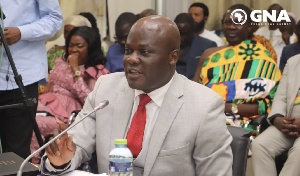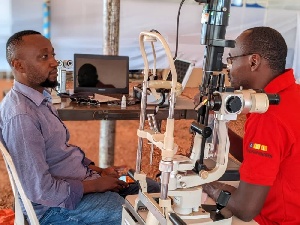- Home - News
- Elections 2024
- News Archive
- Crime & Punishment
- Politics
- Regional
- Editorial
- Health
- Ghanaians Abroad
- Tabloid
- Africa
- Religion
- Photo Archives
- Press Release
General News of Friday, 30 May 2025
Source: www.ghanawebbers.com
Government to train MMDAs to use data for planning
The government is committed to improving the Metropolitan, Municipal, and District Assemblies (MMDAs). This will enhance their ability to collect, manage, and use data for planning and budgeting.
This initiative aims to help MMDAs respond better to citizens' needs. Mr. Ahmed Ibrahim, the Minister of Local Government, announced this in Accra. He spoke at the launch of constituency profile reports for eight constituencies.
The African Centre for Parliamentary Affairs (ACEPA) partnered with the Ghana Statistical Service (GSS) and On Think Tanks for this report. The constituencies included are Akatsi North, Odododiodio, Ablekuma South, Okaikwei South, Amansie Central, Fanteakwa North, Ketu South, Sekyere East, Talensi, and Tano South.
The constituency profile explores existing administrative data. It shows how local data can inform local decisions. This effort is part of the Data for Accountability Project (DAP). DAP aims to improve evidence use in parliament regarding Ghana’s progress on the SDGs.
Reports use time-series data from specific areas. They include information on health, education, and district assembly budgets. The goal is to provide context about development needs for MPs representing these areas.
The report revealed concerning statistics. In Akatsi North and Ketu South, over one-third of children missed kindergarten education. Additionally, more than half of people aged 12 and older in Fanteakwa North cannot read or write in any language.
Mr. Ibrahim emphasized that evidence-based approaches are essential. He believes these reports will enhance policy formulation and planning in MMDAs. He praised the use of administrative data at the district level for creating profiles.
He noted that this aligns central government structures with decentralized entities. The report will connect district-level information with national decision-making processes in Parliament.
Mr. Ibrahim expressed concern about some constituencies not providing necessary data to GSS. He plans to summon 63 defaulting constituencies to explain their actions.
He announced that parliamentary committees would rely on these reports for monitoring purposes. This data will help formulate a formula for disbursing funds in Parliament.
Mr. Ibrahim urged all MPs whose constituencies were profiled to utilize the report effectively. He encouraged them to foster local partnerships and track development indicators while engaging with citizens and local authorities.
Dr. Rasheed Draman from ACEPA stated that the report would inform MPs about key constituency information needed for action. Reliable data is crucial for effective representation in Parliament.
He stressed that democracy should be driven by data so MPs can base debates on credible information when forming national policies.
Dr. Alhassan Iddrisu from GSS said the report would strengthen parliamentary oversight at the district level for timely responses. GSS is ready to collaborate with other institutions to expand research into more constituencies.
Some attending MPs praised their partners for producing this report and promised timely interventions to address challenges within their constituencies.











